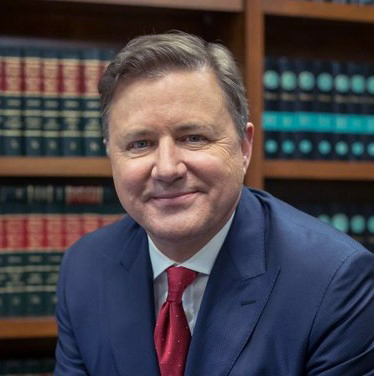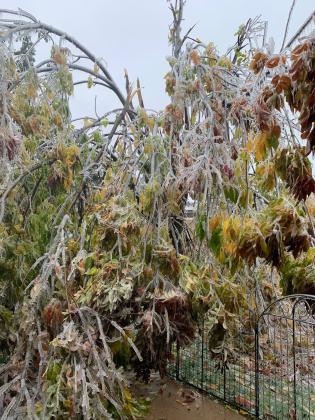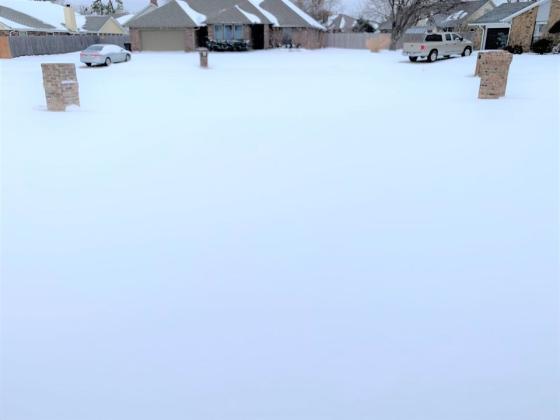Attorney General announces potential legal action from market manipulation in 2021 winter storm

OKLAHOMA CITY — State Attorney General Gentner Drummond announced that he may take legal action against various unidentified entities he believes to be responsible for market manipulation and “other potentially unlawful conduct” arising from Winter Storm Uri.
Drummond said a review he ordered has found that many companies used the aberrant February 2021 storm to “rake in billions of dollars in ill-gotten gains.”
“As a result of the careful and diligent review of conduct during Winter Storm Uri, I discovered that several companies reaped billions of dollars at the expense of businesses and individuals who were suffering from the crippling effects of the storm,” Drummond said.
“The magnitude of this scheme is staggering and unconscionable. Oklahomans can rest assured that I will do everything in my power as Attorney General to return what was taken and hold accountable those responsible.”
Drummond maintained that the Oklahoma oil and gas industry is not to blame. “While we are not yet prepared to name potential defendants, it is important to understand that Oklahoma’s oil and gas industry is not the culprit,” he said.
“At the appropriate time, if we determine that litigation is in the best interests of Oklahoma ratepayers, our complaint will detail each company and individual we believe to be responsible. Until then, I want the people of Oklahoma to remain proud of our oil and gas producers, who are vital partners in the prosperity of our state.”
Drummond said he plans to solicit proposals from outside law firms to pursue the litigation.
“I have been strongly critical of past attorneys general engaged in no-bid, no cap contingency fee arrangements,” he said. “I plan to issue an RFP [request for proposals] to seek the most qualified legal counsel that provides the best possible value to my client: the People of Oklahoma.”
2021 storm cost customers, utilities billions of dollars
In mid-February 2021, the ice, snow and record-breaking cold of Uri held its grip on Oklahoma for two weeks.
As a result, Oklahoma lawmakers enacted legislation (the Regulated Utility Consumer Protection Act) that authorized “securitization” of the exorbitant expenses that utility companies incurred to keep the lights burning and heating units operating during the depths of the two-week winter blast.
Consequently, customers of Oklahoma Gas & Electric Co., Oklahoma Natural Gas Co., Public Service Co. of Oklahoma, Summit Utilities, and Fort Cobb Fuel Authority will be paying surcharges on their utility bills for years to retire ratepayer-backed bonds that were sold to shift those extraordinary expenses off the utilities’ books and to spread the debt over a lengthy period of time.
• In May 2022 the Corporation Commission, which regulates Oklahoma utilities and the oil/gas exploration/production industry, authorized PSO to recover $675.2 million in “extreme purchase costs” that included natural gas and supplemental electricity buys.
The Tulsa-based power company has more than 568,000 customers in eastern and southwestern Oklahoma, and they will be paying on those bonds for 20 years. For a typical residential customer who uses 1,100 kilowatt-hours of electricity per month, the average monthly surcharge will be $4.72, although the actual cost for each customer will depend on their usage.
• The Corporation Commission allowed Oklahoma City-based OG&E, which has 870,000 customers, to recover $739 million in extraordinary expenses from the 2021 winter storm. Its residential customers will be paying an average of $2.12 per month for 28 years to retire those securitization bonds.
• Tulsa-based ONG testified that during Winter Storm Uri it had to use approximately half of all gas it had in storage and was forced to buy natural gas on the spot market at prices that skyrocketed from $2 per unit to almost $1,200. ONG reported it incurred $1.284 billion in fuel costs during the storm; with securitization and financing costs, the total bill came to $1,357,300,000.
ONG has 905,000 residential, commercial and industrial customers. The average ONG residential customer will pay $7.82 per month for 25 years to retire that debt, officials calculated.
• CenterPoint Energy, which subsequently sold its assets in Oklahoma and Arkansas to Summit Utilities, claimed it incurred a $79 million gas bill for the two-week period of February 7-21, 2021. “That was more than three times the company’s cost of gas in all of 2020,” the Corporation Commission was told by Brett Jerasa, assistant treasurer of CenterPoint Energy Services Corp.
The commission authorized CenterPoint/Summit to recover $87,678,270 in extreme purchase costs and extraordinary costs, plus financing costs and upfront securitization expenses. Those expenses will be amortized over a 15-year period; a typical customer will pay $4.36 per month to retire the debt. The natural-gas retail company serves approximately 100,000 residential, commercial, industrial and transportation customers throughout Oklahoma.
Ultimately the state Supreme Court authorized the Oklahoma Development Finance Authority to sell $3 billion in ratepayer-backed bonds that included $725 million to cover PSO’s extraordinary expenses; OG&E, $800 million; Summit Utilities, $95 million; and ONG, $1.45 billion. High interest rates on those bonds increased the final bill substantially.
• Fort Cobb Fuel Authority was the first utility in the state to finalize arrangements to recover extraordinary energy expenses incurred during the extreme winter weather two and a half years ago.
FCFA absorbed $550,000 in additional natural gas purchase costs in February 2021 – particularly Valentine’s Day through Feb. 19 – when Oklahoma was nearly paralyzed by unusual weather that included snow, freezing rain, and wind. A typical bill for gas buys in February is approximately $200,000 to $250,000, attorney Ron Comingdeer of Oklahoma City told Southwest Ledger. FCFA took out a loan to pay that extra $550,000, he said.
The company buys gas from third-party nonaffiliated gas suppliers and distributes the fuel to its customers, Comingdeer said.
The agreement approved by the commission authorized FCFA to recoup $485,292 in expenditures that included purchased gas adjustment costs of $426,356, late charges of $24,895, labor and equipment bills of $10,041, and legal fees totaling $24,000.
The Corporation Commission approved a final order in June 2021 that allowed the FCFA to equalize the base rate among its residential and commercial customers, to impose a stiff disconnection fee through 2023, and to assess its residential and commercial customers a monthly fee known as a “rider” of 7⅔ cents per 100 cubic feet of natural gas consumed over a period of 33 months.
A document filed with the Corporation Commission reported that FCFA provides natural gas to approximately 4,000 rural customers at various locations throughout Oklahoma.
Fort Cobb Fuel Authority is a privately held company owned and operated by Navitas Utility Corp., which is based in California. The Navitas website says it serves 17 Oklahoma counties.
Oklahoma regulators support A.G.’s action
Statements in support of Drummond’s intentions were issued by all three members of the Oklahoma Corporation Commission – although grudgingly by one.
Kim David, the newest member of the commission, said, “Shortly after joining the OCC, I formally asked Attorney General Drummond to investigate possible market manipulation by natural gas marketers during Winter Storm Uri. I appreciate [his] announcement … concluding that market manipulation most likely occurred by certain natural gas marketers during Winter Storm Uri to artificially increase the price of natural gas. Additionally, I am thankful for confirmation that no wrongdoing was done by the Corporation Commission, Oklahoma’s regulated utilities, or the producers of oil and gas.”
Commission Chairman Todd Hiett said, “I am grateful to the Attorney General for his hard work on behalf of all those impacted by Winter Storm Uri and the resulting extraordinarily high natural gas costs utilities had to pay to suppliers in order to provide service.”
Drummond’s allegations “do not involve utilities, but instead target those companies that may have manipulated the natural gas market cost borne by utilities and eventually their customers,” Hiett wrote.
“It is important to note that Commission orders on fuel cost recovery from Uri require utilities to apply savings that result from future federal or legal actions to reduce customers’ bills. I certainly concur with the Attorney General’s finding that there was no wrongdoing on the part of this Commission in its handling of the costs from Winter Storm Uri.”
Hiett and David both said the Attorney General’s Office is the proper agency to investigate the energy market’s actions during the 2021 winter storm.
“I have always held with the prevailing legal opinion that the Attorney General and the Federal Energy Regulatory Commission are the only parties with the legal authority to conduct such an investigation and prosecution,” Hiett said.
Drummond “confirmed what I have known all along: that the OCC lacks the authority to investigate these marketers and his office is capably handing this matter,” said David. She also released a copy of a letter she mailed to Drummond on March 6.
“The Kansas Attorney General recently opened its own investigation into similar companies and their actions surrounding Winter Storm Uri,” she wrote. “I believe that you should conduct a similar investigation. Should you determine that wrongdoing occurred, it is my hope that any overpayments can be returned to Oklahoma ratepayers in compliance with the February 2021 Regulated Utility Consumer Protection Act.”
Veteran Commissioner Bob Anthony referred to dissenting opinions he wrote in 2021 Fuel Cost and Prudence Review cases for OG&E, ONG and PSO.
He also reiterated his disagreement with his commission colleagues, quoting several legal citations that he contends demonstrate that the Corporation Commission “not only has the authority, it has both constitutional and statutory duties to investigate such fraud and market manipulation.”
Anthony condemned as a “coverup” and “damage control” the commission’s votes to approve the utilities’ 2021 fuel costs – which he claimed were the highest in the history of the nation.
“Although I greatly appreciate the Attorney General’s willingness to investigate and perhaps even prosecute market manipulators who profited billions on the backs of Oklahoma utility customers,” his efforts “come two years late, because the Oklahoma Corporation Commission refused to do its duty and protect ratepayers from fraud and market manipulation,” Anthony charged.
“The consequences of this delay may prove very costly to the Attorney General’s pursuit of justice on behalf of ratepayers, especially if he is unable to claw back the $2.1 billion in utility bailout securitization interest and expenses that would never have been incurred if the fraud and market manipulation had been properly investigated by the OCC two years ago. (Adding that $2.1 billion in securitization interest and expenses to the $2.7 billion in fuel costs brought the ratepayers total price tag for the February 2021 Winter Storm to $4.8 billion.)”



